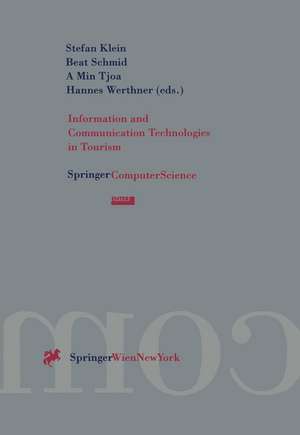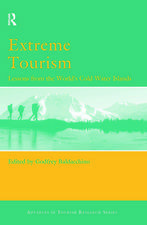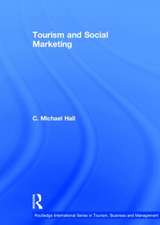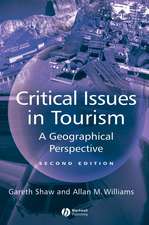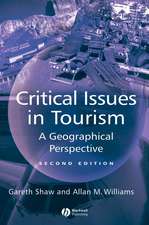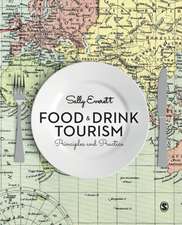Information and Communication Technologies in Tourism: Proceedings of the International Conference in Innsbruck, Austria 1996
Editat de Stefan Klein, Beat Schmid, A Min Tjoa, Hannes Werthneren Limba Engleză Paperback – 4 ian 1996
Preț: 332.06 lei
Preț vechi: 415.08 lei
-20% Nou
Puncte Express: 498
Preț estimativ în valută:
63.56€ • 69.06$ • 53.42£
63.56€ • 69.06$ • 53.42£
Carte tipărită la comandă
Livrare economică 21 aprilie-05 mai
Preluare comenzi: 021 569.72.76
Specificații
ISBN-13: 9783211827987
ISBN-10: 3211827986
Pagini: 252
Ilustrații: XII, 234 p.
Dimensiuni: 170 x 244 x 13 mm
Greutate: 0.41 kg
Ediția:Softcover reprint of the original 1st ed. 1996
Editura: SPRINGER VIENNA
Colecția Springer
Locul publicării:Vienna, Austria
ISBN-10: 3211827986
Pagini: 252
Ilustrații: XII, 234 p.
Dimensiuni: 170 x 244 x 13 mm
Greutate: 0.41 kg
Ediția:Softcover reprint of the original 1st ed. 1996
Editura: SPRINGER VIENNA
Colecția Springer
Locul publicării:Vienna, Austria
Public țintă
ResearchDescriere
For the third time now, experts in tourism from all over the world come to Innsbruck in order to exchange ideas, inform themselves and others about current developments and build a network of personal relations. The main topics of ENTER 96 are business engineering and standardisation, covering a wide area of subjects like the redesign of touristic products and the processes of their production. This covers, however, not only single business processes but also the entire value chain in tourism, ending up in redesign of distribution channel and changing relations among principals, tour operators, travel agents and customers. Standardisation increasingly becomes a prerequisite for interorganisational coordination and cooperation, EDI is slowly being introduced in tourism and Internet related standards like HTML and VRML. will have a major impact on the future development of electronic distribution platforms for services in tourism. As the proceedings underscore, ENTER has been established as an international platform for scientific and practical discourse on Information and Communication Technologies in Tourism. The close interdisciplinary link between technological and economic questions in tourism opens up new, promising threads for applied research and development likewise.
Cuprins
1. Intelligent Agents.- A Personal Travel Assistant for Holiday Selection — a Learning Interface Agent Approach.- IMTAS: Intelligent Multimedia Travel Agent System.- 2. Multimedia.- A Software Bench for the Production of Multimedia Tourism Applications.- Clustering in Object-oriented Distributed System Integrating Multimedia Resources.- Integration of Multimedia and Spatial Data in an Authoring System for Building Tourism Applications.- 3. Data Management and Representation.- Why Is Space a Slippery Concept for Information Systems Designers? Towards a Definition of Spatial Information Primitives for the Tourism Information Base.- The Lost Tourist in a Cross Border Region, Asking for Alignment of Information Architectures.- An Electronic Product Catalog for Distributed Environments.- 4. Information System Design.- Design Principles of Tourist Information Systems.- Interfacing WWW with Distributed Database Applications in the Field of Tourism.- 5. Implementation and Adoption.- Client Satisfaction Measurement in Outsourcing Situations.- Information Technology Adoption by Midwest United States Travellers.- Case Study of Implementation of Information System in Tourism.- 6. IS Strategy I: Application of Business Concepts in Tourism.- The IT-enabled Extended Enterprise, Applications in the Tourism Industry.- Travel Information Kiosks in Network — Prestige or Profit? A Preliminary Study of a Norwegian System in Operation.- 7. IS Strategy II: Strategies for Regions and Destinations.- Information and Telecommunication Technologies as a Strategic Tool for Tourism Enhancement at Destination Regions.- The Travel Industry as Part of the National Information Network in Norway.- 8. IS Strategy III: Impact on Different Actors.- The Changing Value of Travel Agents in Tourism Networks: Towards a Network Design Perspective.- Barriers to Implementing Quality Management in Hong Kong’s Hotels.- 9. IS Strategy IV: Distribution and Marketing.- Public Tourist Information Offices as Booking-Centres for Accommodation.- Last-Minute Booking Based on Internet in Norway.- Broadband Network in the Electronic Market Place in Tourism.- The Electronic Mall Bodensee as Platform for the Development of Travel Services.- 10. StandardisSation and Reengineering Issues.- Application Standards for Tourism Products. Proposals for a Programme of Research.- Re-Engineering the Package Holiday Business.
